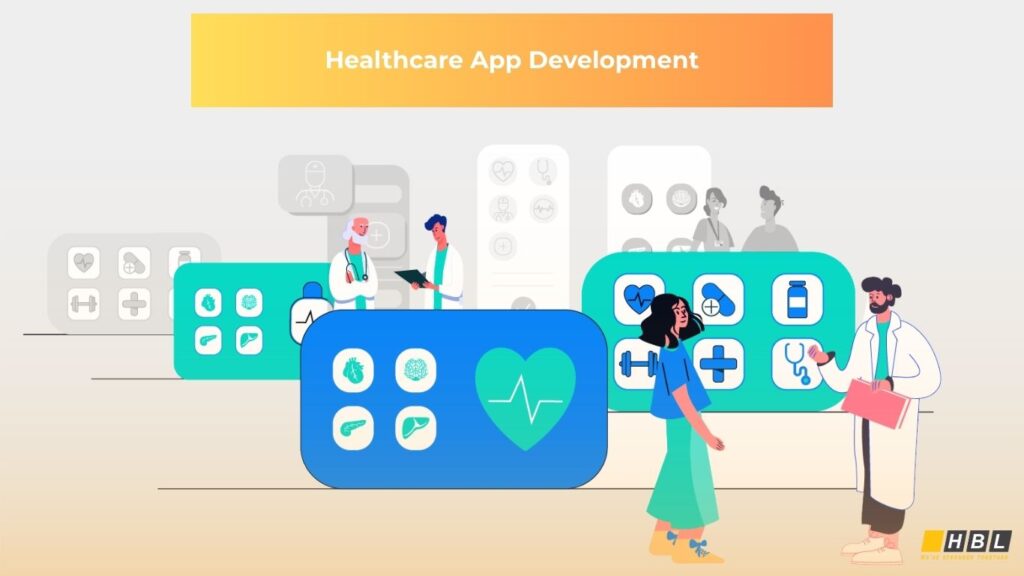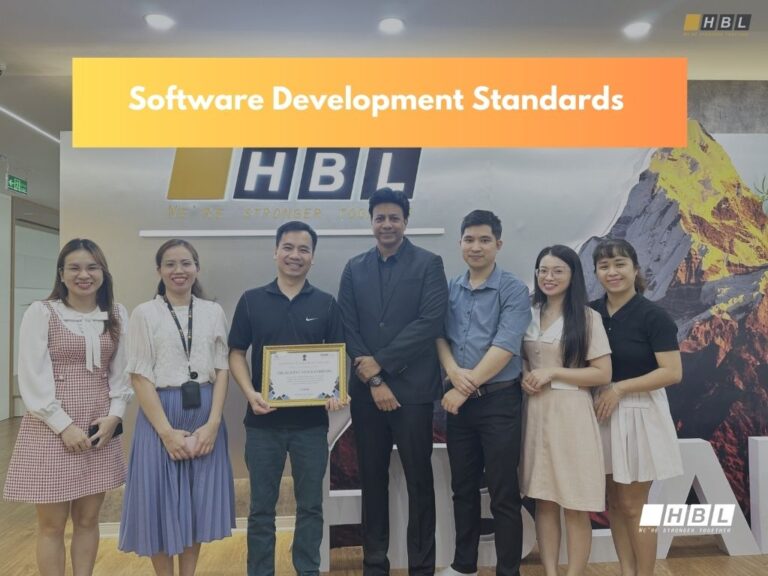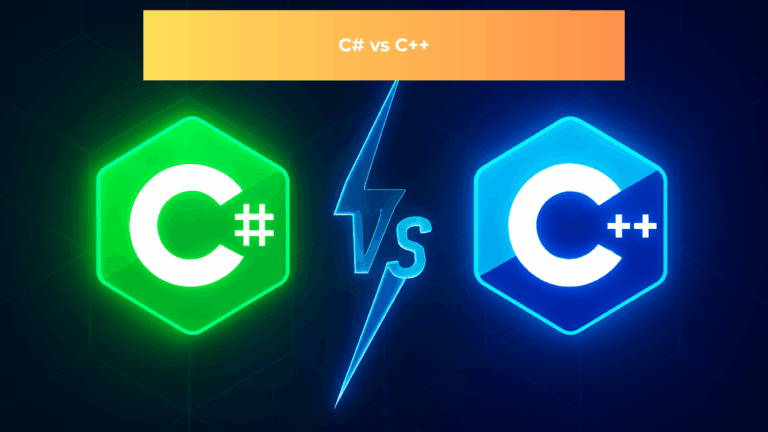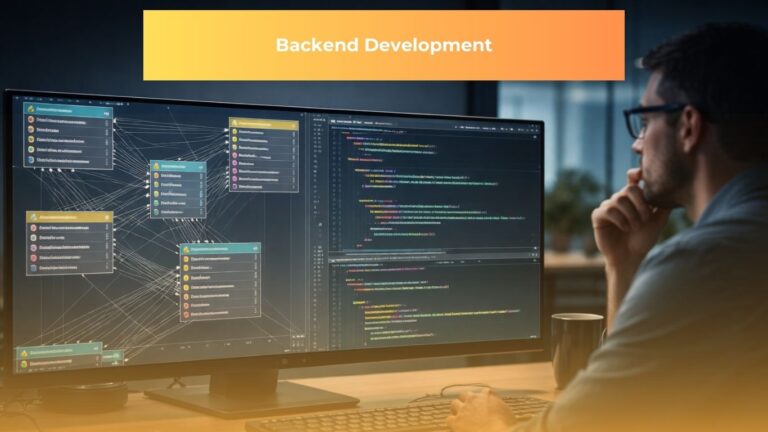In today’s rapidly evolving digital landscape, technology is reshaping every industry, and healthcare is no exception. The surge in mobile device usage has ushered in a new era for healthcare app development, transforming smartphones into powerful tools for health management, healthcare access, and overall well-being. From personal health trackers to complex telemedicine platforms, the development of healthcare applications is an inevitable trend, offering unparalleled benefits to patients, medical professionals, and the entire healthcare system.
This article delves deep into the world of healthcare app development, exploring its importance, popular app types, essential features, the myriad benefits they offer, and the challenges that must be overcome. We’ll also examine the latest trends shaping the future of these applications and key factors to consider when choosing a healthcare app development partner.
The Undeniable Importance of Healthcare App Development
Why has healthcare app development become so critical? The answer lies in its ability to address existing pain points within the healthcare industry and introduce unprecedented conveniences:
- Enhanced Healthcare Accessibility: In many regions, accessing specialist doctors or medical facilities can be challenging. Mobile healthcare apps, especially telemedicine, break down geographical barriers, allowing patients to receive remote medical consultations, which is particularly useful in urgent situations or for individuals in remote areas.
- Improved Patient Experience: From online appointment booking, automated medication reminders, and viewing lab results to participating in personalized health programs, healthcare apps empower patients to take a more active role in managing their health, reducing waiting times, and boosting satisfaction.
- Streamlined Workflows for Medical Professionals: Doctors, nurses, and healthcare staff can leverage apps to manage electronic health records (EHR/EMR), remotely monitor patients, access drug information, and even collaborate with colleagues more efficiently. This reduces administrative burdens, saves time, and minimizes errors.
- Promoting Preventive Care and Chronic Disease Management: Health tracking, fitness, and nutrition apps help users proactively prevent illnesses. For chronic disease patients, apps provide tools to monitor vital signs, remind them to take medication, and log progress, thus helping them manage their health conditions more effectively.
- Reducing Strain on Healthcare Systems: By reducing unnecessary visits, optimizing resource utilization, and improving operational efficiency, healthcare apps contribute to alleviating pressure on hospitals and clinics.
- Personalized Healthcare: Based on collected data, apps can offer tailored advice, treatment plans, and health goals specific to each individual, moving towards a patient-centric healthcare model.

Popular Types of Healthcare Apps Today
The landscape of healthcare app development is incredibly diverse, encompassing various app types designed for distinct purposes:
- Telemedicine/Telehealth Apps: These allow patients to consult with doctors online via video, chat, or phone. Features often include appointment scheduling, online payments, and e-prescription management.
- Examples: Teladoc, Amwell.
- Electronic Health Record (EHR)/Electronic Medical Record (EMR) Apps: These aid doctors and healthcare staff in securely and efficiently accessing, updating, and managing patients’ electronic medical records.
- Examples: Epic Haiku, Cerner PowerChart.
- Health & Fitness Tracking Apps: These help users monitor health metrics like heart rate, step count, sleep patterns, and calorie intake. They often integrate with wearables.
- Examples: MyFitnessPal, Google Fit, Apple Health.
- Chronic Disease Management Apps: These provide tools for patients with diabetes, high blood pressure, asthma, etc., to track indicators, receive medication reminders, log symptoms, and share data with their doctors.
- Examples: OneTouch Reveal, MyTherapy.
- Doctor Appointment & Healthcare Service Finder Apps: These enable users to easily find doctors by specialty, location, read reviews, and book appointments online.
- Examples: Zocdoc, Practo.
- Mental Health Apps: Offering meditation exercises, cognitive-behavioral therapy (CBT) programs, mood tracking tools, and connections to therapists.
- Examples: Calm, Headspace, BetterHelp.
- Pharmacy & Medication Reminder Apps: These help users manage prescriptions, receive medication reminders, look up drug information, and check for drug interactions.
- Examples: Medisafe, GoodRx.
- Clinical Decision Support (CDS) Apps: Providing evidence-based medical information, drug dosage calculators, and clinical guidelines for healthcare professionals.
- Examples: Epocrates, UpToDate.
- Pregnancy & Baby Care Apps: Tracking pregnancy milestones, fetal development, childhood vaccination schedules, and offering advice for parents.
- Examples: BabyCenter, Ovia Pregnancy Tracker.
Medical Education Apps: Delivering reliable medical information about diseases, health conditions, and medical procedures to the public or medical students.
Essential Core Features for a Successful Healthcare App
For a healthcare app to be truly useful and successful, it needs to integrate several critical features:
- Secure User Registration & Profiles: Ensure an easy registration process while keeping personal information absolutely secure.
- Intuitive User Interface (UI) and User-Friendly Experience (UX): Easy to use, clean design, clear, and accessible to all ages and tech proficiency levels.
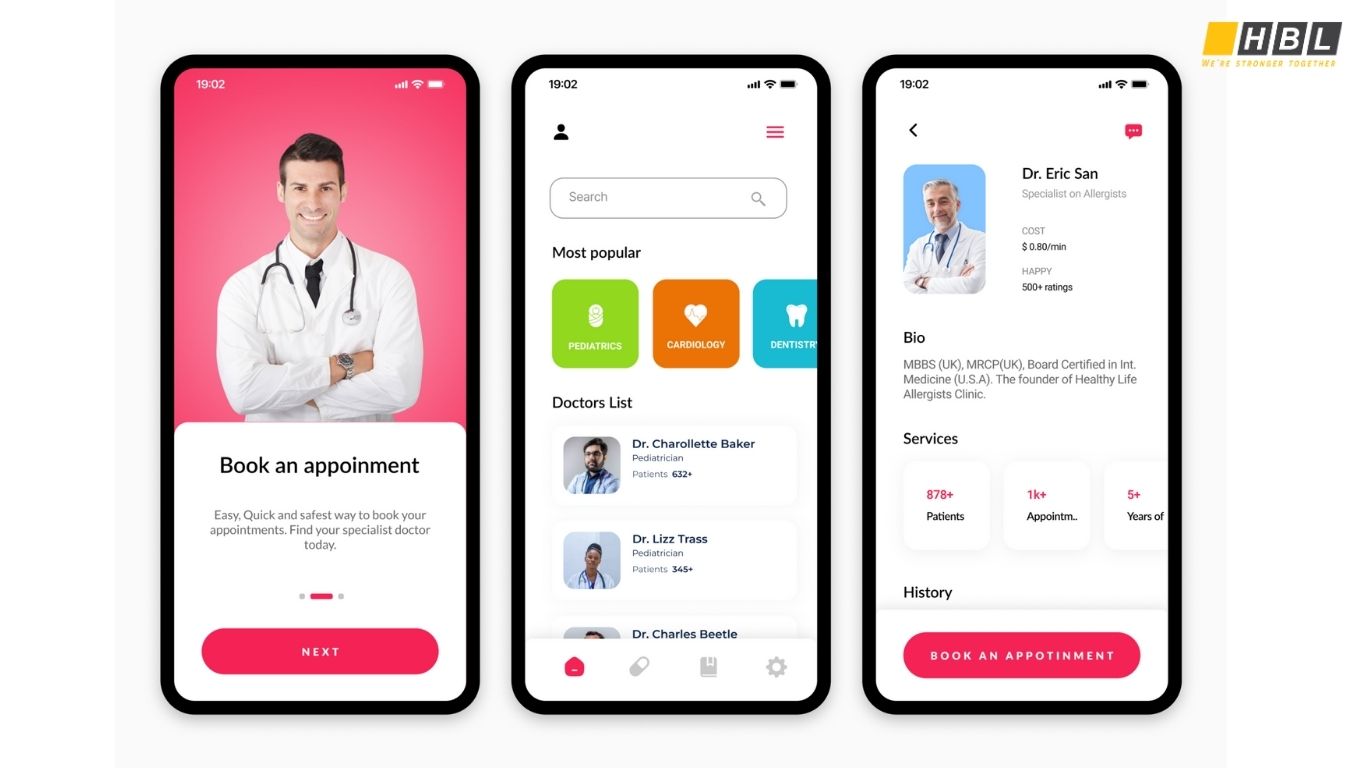
- Electronic Health Records/Health History: The ability to store and access important medical information (allergies, current medications, medical history).
- Appointment Booking & Reminders: Allow users to book appointments online with doctors or clinics and receive automated reminders.
- Video/Audio Calls and Chat: Core features for telemedicine apps.
- Push Notifications: For medication reminders, appointment alerts, and information updates.
- Integration with Medical Devices/Wearables: Connect with smartwatches, blood pressure monitors, glucose meters to automatically collect data.
- Prescription Management: Ability to view, refill prescriptions, and find pharmacies.
- Secure Online Payments: Integrate reliable payment gateways.
- Search & Filter: Search for doctors, clinics, or services by specialty, location, or ratings.
- Dashboard/Analytics: Display health data in charts and graphs, helping users easily track progress.
- Emergency (SOS) Feature: An emergency call button or location sharing in case of medical urgency.
- Drug Interaction/Allergy Check: Alerts for potential drug interactions or allergies.
Educational Content: Provide reliable medical information.
Challenges in Healthcare App Development: Overcoming Obstacles for Success
Developing a healthcare app isn’t just about technical prowess; it involves navigating numerous complex factors:
- Data Security & Privacy: This is the biggest and most critical challenge. Medical data is sensitive and personal, requiring the highest level of security. Developers must strictly adhere to regulations like HIPAA (USA), GDPR (Europe), PIPEDA (Canada), APPs (Australia), or personal data protection laws in Singapore. Any breach can lead to severe legal consequences and reputational damage.
- Regulatory Compliance: The healthcare industry is one of the most heavily regulated sectors. Healthcare apps may need to comply with regulations from the FDA (U.S. Food and Drug Administration) if classified as Software as a Medical Device (SaMD), or quality standards like ISO 13485. Navigating this complex web of regulations requires deep understanding and experience.
- Integration with Existing Systems: Many hospitals and clinics operate with legacy EHR/EMR systems. Integrating a new app with these systems can be highly complex, demanding high compatibility and data standardization.
- User Experience (UX) for Diverse Users: Healthcare apps must cater to a wide range of users, from tech-savvy young individuals to elderly users less familiar with mobile devices. UI/UX design needs to be intuitive, easy to use, and accessible.
- Data Quality and Accuracy: Medical data must be 100% accurate. Even minor errors can lead to serious consequences. Therefore, testing and data verification processes must be extremely rigorous.
- Scalability: The app must be able to handle a large volume of users and data as demand grows without compromising performance.
- Monetization: Building a sustainable business model for a healthcare app is a challenge. Common models include freemium, subscriptions, transaction fees, or partnerships with healthcare providers.
- Technology and Integration: Integrating new technologies like AI, IoT, and blockchain requires deep knowledge and specialized skills from the development team.

The Future Trends of Healthcare App Development
The world of healthcare applications is continuously evolving with remarkable trends:
- Artificial Intelligence (AI) and Machine Learning (ML): AI and ML will play an increasingly vital role in analyzing vast amounts of health data, early disease diagnosis, personalizing treatment plans, detecting disease patterns, and even accelerating drug discovery.
- Internet of Medical Things (IoMT): The combination of IoT and medical devices (glucose monitors, blood pressure cuffs, smart wearables) will enable continuous, real-time data collection, opening up possibilities for remote patient monitoring and more effective preventive medicine.
- Blockchain for Security and Transparency: Blockchain technology has the potential to revolutionize healthcare record security, ensuring data integrity and transparency while empowering patients with control over their health data.
- Virtual Reality (VR) and Augmented Reality (AR): VR/AR are being applied in medical training, surgical simulation, rehabilitation therapy, and even non-pharmacological pain management.
- Chatbots and Virtual Assistants: AI-powered chatbots can provide basic health information, answer frequently asked questions, schedule appointments, and offer 24/7 user support.
- Behavioral Health and Digital Mental Health: A growing number of apps are focusing on mental well-being, providing online therapy, stress management tools, and community support.
Personalization and Precision Medicine: Apps will increasingly use personal data (genomics, lifestyle, environment) to deliver highly personalized healthcare solutions.
Crucial Factors When Choosing a Healthcare App Development Partner
Selecting the right development partner is a pivotal factor in the success of your healthcare app development project. Consider the following:
- Deep Industry Expertise in Healthcare: Ensure the partner has practical experience in developing healthcare applications, not just general mobile apps. They must have a clear understanding of clinical workflows, medical terminology, and industry specifics.
- Profound Knowledge of Regulations & Security: This is a crucial point. The partner must be well-versed in regulations like HIPAA, GDPR, APPs, and have experience implementing high-level data security solutions.
- Portfolio and Client Testimonials: Review their past healthcare projects and read testimonials from previous clients.
- Development Team and Expertise: Ensure the team possesses adequate skills in programming (iOS, Android, backend), UI/UX, QA (quality assurance), security, and project management. A high percentage of senior-level staff is a significant advantage.
- Flexible Development Methodology (Agile): An agile approach allows for quick adjustments based on feedback and changing requirements.
- Post-Deployment Support and Maintenance: Healthcare apps require continuous maintenance and updates. Ensure the partner can provide long-term support.
- Cost and Engagement Models: Request detailed, transparent quotes and choose a collaboration model that fits your budget and strategy (e.g., Offshore, Dedicated Team).
- Work Culture and Communication: Clear, effective communication is key. The partner should have strong communication skills in your preferred language (e.g., English).
HBLAB – Your Comprehensive Healthcare App Development Partner
In the increasingly competitive and demanding landscape of healthcare app development, finding a reliable development partner is crucial. HBLAB proudly stands as a leading technology company, specializing in providing comprehensive healthcare app development solutions, from initial concept to deployment and ongoing maintenance, helping you create innovative and secure applications.
Committed to delivering exceptional value and world-class quality, HBLAB possesses distinct strengths that make us an ideal choice for your healthcare app project:
- Extensive Expert Team and Global Network: HBLAB boasts over 630+ highly qualified professionals, including experienced engineers and tech specialists with deep insights into the healthcare sector. With our headquarters in Vietnam and strategic branch offices in key markets like Australia, Singapore, Japan, and Korea, we ensure rapid support, a profound understanding of local regulations and business cultures, helping your project achieve global reach.
- Superior Communication and Professional Expertise: At HBLAB, we understand that effective communication is paramount for any successful collaboration, especially in complex projects. Our team members possess excellent English communication skills, ensuring seamless and efficient exchanges throughout the development process. Notably, over 30% of our staff are Senior-level employees with over 5 years of experience working on challenging and demanding projects across various domains, including healthcare. This means your solutions will be built by top-tier experts, guaranteeing maximum quality and reliability.
- Flexible Engagement Models to Suit Every Need: HBLAB offers a diverse range of engagement models to align with each client’s business strategy and budget. Whether you’re seeking Offshore solutions for cost optimization, require an Onsite team integrated directly into your work environment, wish to build a Dedicated Team exclusively for your project, or are interested in a BOT (Build-Operate-Transfer) model to transition technology and the team after stabilization, HBLAB can accommodate. This flexibility empowers your business to choose the most optimal approach.
- High-Quality Workforce at Reasonable Costs: HBLAB is committed to providing top-tier healthcare app development services at highly competitive costs, up to 30% lower than local rates in many Western countries. You gain access to a talented workforce with diverse programming skills across various platforms and the latest technologies, significantly reducing your budget while ensuring outstanding product quality and efficiency.
- Strict Security Compliance and High-Quality Standards: Healthcare data security is HBLAB’s utmost priority. We are committed to strictly adhering to Security requirements and development processes, evidenced by our CMMI Level 3 certification. This ensures that your healthcare app is not only functional and effective but also built with the highest levels of security, minimizing risks from cyber threats and allowing you to focus on your core business with peace of mind.

How HBLAB can empower your healthcare vision: Partnering with HBLAB for your healthcare app development means:
- Transforming complex medical challenges into user-friendly digital solutions.
- Ensuring your application is compliant with the strictest global healthcare regulations.
- Gaining access to a vast pool of specialized talent at an optimized cost.
- Accelerating your time to market with efficient development methodologies.
- Building a secure and scalable app that can grow with your healthcare needs.
Conclusion
In the context of modern business, healthcare app development is no longer a luxury but a strategic imperative. Entrusting your healthcare IT needs to experts not only helps your organization mitigate risks and optimize costs but also opens doors to advanced technology and leading expertise. This allows you to focus entirely on innovation, product development, and core business strategies to achieve sustainable success.
Let HBLAB be your trusted healthcare app development partner. With our extensive team of experts, global experience, flexible engagement models, and the highest commitment to security, we are ready to accompany you on your digital transformation journey and sustainable growth.
Contact HBLAB today for a free consultation and discover how our healthcare app development services can transform your business!
See more:
– Vietnam Artificial Intelligence: A Rising Powerhouse for Global AI Solutions
– Unlock Business Growth with the Right Data Warehouse Solution – Here’s How
